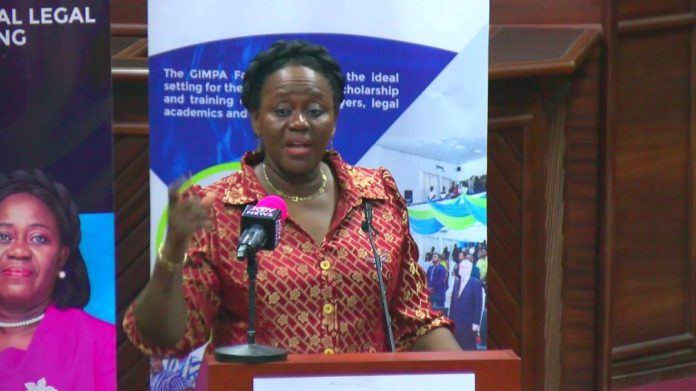The Supreme Court has struck out an injunction filed by the National Democratic Congress (NDC) and four other political parties which sought to stop the EC from going ahead with the limited voter registration exercise.
A five-member panel presided over by the Chief Justice, Justice Gertrude Sackey Torkornoo, struck out the application following the failure of the applicants or their lawyers to appear in court to move the application.
When the case was called on Tuesday, there was no lawyer or representative representing the NDC or any of the political parties.
A Deputy Chairperson of the EC, Bossman Eric Asare and lawyer for the EC, Justine Amenuvor, were, however, present in court.
Other Justices of the apex court who struck out the application were Paul Baffoe-Bonnie, Henrietta Mensa-Bonsu, Barbara Ackah Yensu and Ernest Yao Gaewu.
Application and criticisms
The EC decided to conduct the limited voter registration exercise only at its district offices.
Following that decision, the NDC and four other political parties — the Convention People’s Party (CPP), the All-Progressive Congress (APC), the Liberal Party Ghana (LPG) and the Great Consolidated Popular Party (GCPP) dragged the EC to the Supreme Court, arguing that the move by the EC was unconstitutional as it would impede people’s right to register and vote.
The suit, filed on September 7, 2023, also included an application for injunction seeking to stop the EC from going ahead with the registration exercise until the determination of the suit.
The EC, however, started the exercise on September 12 and concluded it on October 2, 2023.
Many notable persons, including former President John Dramani Mahama, criticised the Supreme Court for not hearing the application when the voter registration exercise was in full force.
Former President Mahama said the inability of the apex to hear the injunction was a blot on justice delivery.
“This is unprecedented and does not augur well for public confidence in the justice delivery system,” he wrote on social media.
Legal vacation
At Tuesday’s hearing, the Chief Justice explained for the benefit of journalists present in the courtroom that the Supreme Court and the Court of Appeal do not sit during the legal vacation which is in the months of August and September.
Justice Torkornoo said while the rules of court and laws allowed the High Court to hear cases on a limited basis during the legal vacation, there was no such dispensation for the Supreme Court and the Court of Appeal.
She added that it was based on the legal vacation that the court sat on the application by the five political parties at the earliest date possible which was Tuesday, being the very first Supreme Court sitting in the new legal year.
“The Supreme Court could not have dealt with any application except by an extreme special fiat,” the Chief Justice said.
Substantive suit
In a suit invoking the original jurisdiction of the apex court, the five parties were of the view that limiting the exercise to the EC’s district offices would not be suitable and accessible to every Ghanaian who was desirous of exercising his or her constitutional right to be registered as a voter.
ALSO READ:

